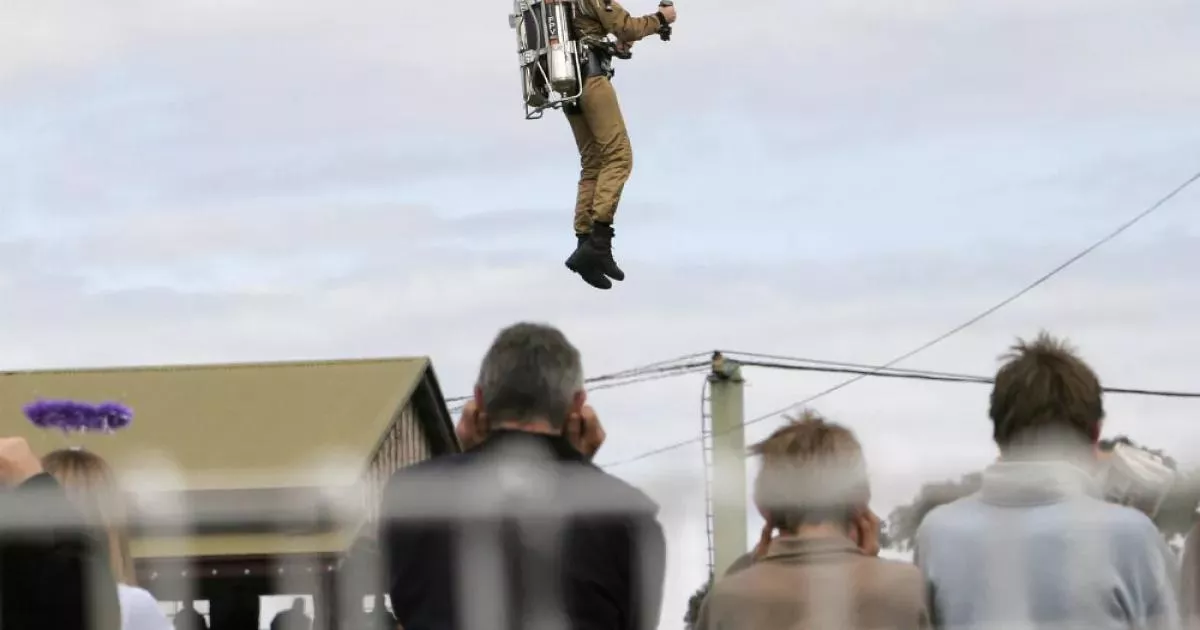A jet pack, also known as a rocket belt, rocket pack, or flight pack, is a backpack-like device that uses jets to propel the wearer into the air. This concept, popularized in science fiction for nearly a century, saw its first working prototypes emerge in the 1960s.
1919: First Jet Pack Design
The first recorded jet pack design was created in 1919 by Russian inventor Alexander Fedorovich Andreev. This oxygen-and-methane powered design, featuring 1-meter long wings, was patented but never built or tested.
1928: Early Depiction of Jet Packs in Popular Culture
The concept of jet packs emerged in popular culture long before its realization, with an early depiction appearing on the cover of Amazing Stories magazine in 1928.
1956: Justin Capră's "Flying Rucksack"
Justin Capră claimed to have invented a "flying rucksack" in 1956. While initially met with disinterest, the design was later tested and refined, contributing to the development of jet packs at Bell Laboratories in 1962.
1958: Project Grasshopper
Thiokol Corporation engineers Garry Burdett and Alexander Bohr developed the "Jump Belt" in 1958. This compressed nitrogen-powered device allowed the wearer to jump 7 meters high and run at speeds up to 50 km/h. Despite successful demonstrations, lack of funding halted further development.
1959: U.S. Army Jet Pack Contract
In 1959, Aerojet General Corporation secured a contract with the U.S. Army to design a jet pack. This marked the beginning of significant research and development in the field.
August 1960: Bell Aerosystems and SRLD Development
In August 1960, the U.S. Military, recognizing Wendell F. Moore's prior research, commissioned Bell Aerosystems to develop a Short Range Limited Duration (SRLD) jet pack, marking a pivotal shift in jet pack development towards military applications.
1960: Richard Peoples' First Tethered Flight
In 1960, Richard Peoples conducted his first tethered flight using the Aerojet General Aeropack. This marked a key milestone in the development of functional jet packs.
1960: Bell Rocketbelt Unveiled
The Bell Rocketbelt, a hydrogen peroxide-powered jet pack, was publicly introduced in 1960, representing a major milestone in jet pack technology.
1962: Bell Laboratories Jet Pack
Building on Justin Capră's prototype, Bell Laboratories created a backpack in 1962. This marked a significant step in jet pack development and is now a museum exhibit.
1964: Jet Packs Featured in Jonny Quest Animated Series
The animated television series "Jonny Quest," which aired from 1964 to 1965, featured jet packs in a couple of its episodes, further solidifying their presence in popular culture.
1965: DARPA's "Jet Flying Belt" Project
In 1965, the Defense Advanced Research Projects Agency (DARPA) contracted Bell Aerosystems to develop a turbojet-powered jet pack known as the "Jet Flying Belt" or "Jet Belt", signaling continued interest in jet pack technology for potential military applications.
1965: Jet Pack in James Bond's "Thunderball"
In the 1965 James Bond film "Thunderball," Sean Connery, as James Bond, uses a jet pack in a memorable pre-title sequence to escape villains and meet his French contact. The jet pack was piloted by Gordon Yaeger and Bill Suitor.
1965: Jet Packs in "Lost in Space" Television Series
The "Lost in Space" television series, which aired from 1965 to 1968, featured members of the Jupiter 2 expedition using a jet pack in several episodes.
1965: Jet Packs Featured in Jonny Quest Animated Series
The animated television series "Jonny Quest," which aired from 1964 to 1965, featured jet packs in a couple of its episodes, further solidifying their presence in popular culture.
1966: "Rocket Jumper" Book Features Hydrogen Peroxide Jet Pack
The 21st book in the Rick Brant series, "Rocket Jumper," published in 1966, centers around a hydrogen peroxide-fueled jet pack. The book provides a detailed description of the jet pack's design, including the use of a platinum-metal screen catalyst.
1968: End of "Lost in Space" Television Series
The "Lost in Space" television series, which ran from 1965 to 1968 and featured a jet pack used by the Jupiter 2 expedition, ended.
April 1969: First Free Flight of the Bell Jet Flying Belt
On April 7, 1969, the Bell Jet Flying Belt, powered by a turbojet engine, achieved its first free flight, covering 100 meters at an altitude of 7 meters. This milestone demonstrated the potential of turbojet technology for jet pack propulsion.
May 1969: Wendell Moore's Passing and End of Turbojet Pack Development
The development of the turbojet-powered jet pack suffered a major setback in May 1969 with the death of Wendell Moore. Following his passing, Bell sold the prototype and related technology to Williams Research Corporation, marking the end of an era in jet pack innovation.
1973: Jet Pack Mishap in Woody Allen's "Sleeper"
In the 1973 film "Sleeper," Woody Allen's character attempts to escape from the police of 2173 using a rocket pack. However, he accidentally activates it before securing himself, causing it to fly away without him.
1976: "Jet Jumper" Jet Pack in "Ark II" Television Series
The 1976 television series "Ark II" introduced a jet pack called the "Jet Jumper."
1982: "The Rocketeer" Comic Book Series Launch
The comic book series "The Rocketeer," which debuted in 1982 and ran until 1995, features protagonist Cliff Secord, who becomes the eponymous superhero after acquiring a stolen Cirrus X-3 military jet pack.
1982: G.I. Joe Action Figure with JUMP Jet Pack
The launch of the 95 mm (3.75-inch) G.I. Joe action figure in 1982 included the JUMP (Jet Mobile Propulsion Unit) jet pack as an accessory. The jet pack was also prominently featured in the accompanying G.I. Joe comic book series and cartoon.
1983: Powerhouse Productions and Jet Pack Entertainment
Since 1983, Powerhouse Productions has been showcasing jet pack flights globally, integrating them into entertainment events like the Super Bowl and Michael Jackson's Dangerous World Tour, demonstrating their spectacle and public appeal.
1984: Jet Pack in Public Display
In 1984, a jet pack was flown during the opening ceremony of the Summer Olympic Games in Los Angeles. This event highlighted the use of jet packs for public demonstrations and stunts.
1984: Bell Rocketbelt at the 1984 Olympics
The Bell Rocketbelt, a type of jet pack, was featured in the 1984 Olympics.
1988: "Rocket Ranger" Computer Game Release
Cinemaware released the Amiga computer game "Rocket Ranger" in 1988, which was later ported to various other platforms of the time.
1991: "Rocket Ranger" Comic Series Debut
Malibu Comics launched a comic book series based on the computer game "Rocket Ranger" in 1991, which continued until 1992. The comic closely followed the storyline of the game.
1991: "The Rocketeer" Film Adaptation
The comic book series "The Rocketeer," which began in 1982 and featured protagonist Cliff Secord's use of a stolen Cirrus X-3 military jet pack to become the titular superhero, was adapted into a motion picture in 1991.
1992: "Rocket Ranger" Comic Series Ends
Malibu Comics concluded the "Rocket Ranger" comic book series in 1992, which had been running since 1991. The comic was closely based on the computer game of the same name.
1993: Jet Packs in "SWAT Kats" Cartoon Series
Jet packs made appearances in several episodes of the animated series "SWAT Kats," which aired from 1993 to 1994, featuring the titular characters using them.
June 1994: Powerhouse Productions' Rocketbelt
In June 1994, Powerhouse Productions introduced their 30-second flying Rocketbelt.
1994: "SWAT Kats" Cartoon Series Ends
The animated series "SWAT Kats," which ran from 1993 to 1994 and included jet packs in several episodes featuring the title characters, concluded.
1995: Buzz Lightyear's Jet Pack in "Toy Story"
The 1995 animated film "Toy Story" introduced Buzz Lightyear, a toy space ranger who famously sported a plastic jet pack.
1995: "The Rocketeer" Comic Book Series Ends
The comic book series "The Rocketeer," which debuted in 1982 and featured protagonist Cliff Secord using a stolen Cirrus X-3 military jet pack to become the eponymous superhero, concluded in 1995.
1997: Jet Pack Action in "Crash Bandicoot 2: Cortex Strikes Back"
In the 1997 video game "Crash Bandicoot 2: Cortex Strikes Back," the main character, Crash, utilizes a jet pack in two primary levels: "Rock It" and "Pack Attack." The jet pack also plays a role in the climactic boss battle against Dr. Neo Cortex.
June 2004: First Successful Test Flight of Rossy's Jet Pack
Yves Rossy conducted his first successful test flight of his jet pack near Geneva, Switzerland in June 2004.
2004: Peroxide Propulsion and Fuel Challenges
In 2004, Peroxide Propulsion in Sweden began producing high-concentration hydrogen peroxide, a key fuel for jet packs, addressing a significant challenge faced by developers.
October 2005: Visa Parviainen's Turbojet Wingsuit Flight
In October 2005, Visa Parviainen successfully demonstrated a wingsuit equipped with two small turbojet engines, achieving approximately 30 seconds of horizontal flight without altitude loss.
November 2006: Rossy's Flight with an Upgraded Jet Pack
Yves Rossy flew an improved version of his jet pack in November 2006, showcasing advancements in the technology.
April 2007: Jetpack International Models
In April 2007, Jetpack International presented three wingless jet pack models, including the Jet Pack H2O2, capable of flying for 34 seconds using hydrogen peroxide fuel.
2007: Relocation of Rossy's Flight Tests
In 2007, Yves Rossy started conducting his jet pack flight tests from Skydive Empuriabrava in Spain.
April 2008: Exhibition of Rossy's Jet Pack
In April 2008, Yves Rossy's jet pack was displayed at the 35th Exhibition of Inventions in Geneva.
May 2008: Rossy's Public Jet Pack Flight Demonstration
Yves Rossy conducted a public flight demonstration of his jet pack in May 2008, captivating the world's press with a 6-minute flight near Lake Geneva.
September 2008: Rossy's English Channel Crossing
Yves Rossy achieved a groundbreaking feat in September 2008 by flying across the English Channel using his jet pack.
2008: Invention and Patent of the JetLev Hydro Jet Pack
The JetLev, the first commercially available hydro jet pack, was invented, and its creators secured patents for the technology in 2008.
2008: Development of Wingless Jet Pack Design
Troy Hartman embarked on designing a jet pack without wings, powered by two turbojet motors, in 2008.
2010: Peroxide Propulsion Fuel Production Halted
Following a serious accident in 2010, Peroxide Propulsion ceased production of high-concentration hydrogen peroxide, highlighting the risks and complexities associated with jet pack fuel sources.
2011: Development of the Flyboard Water Jet System
Development of the Flyboard, a unique hydroflight system with foot-mounted water jets, commenced in the spring of 2011, introducing a novel approach to water-based recreation.
February 2012: Rossy's Jet Pack Race Against a Rally Car
In February 2012, Yves Rossy participated in a unique race, piloting his jet pack against a Skoda rally car on an episode of Top Gear.
2012: Jet Pack in "Halo 4"
The 2012 video game "Halo 4," developed by 343 Industries, features the reappearance of the jet pack, a popular equipment piece from its predecessor, "Halo: Reach."
2013: Clarke's Rocketbelt Flight at Brisbane's EKKA Show
David "Dakka" Clarke flew his self-built, hydrogen-peroxide-fueled rocketbelt at the Brisbane EKKA show in 2013, demonstrating his engineering prowess.
2013: Development of the Skyflash Jet Pack
Fritz Unger initiated the development of the Skyflash jet pack in Germany in 2013.
2013: Rise of Hydro Jet Pack Rental Businesses
The popularity of hydro jet packs surged in 2013, leading to the establishment of numerous rental businesses offering this exhilarating water activity worldwide.
2013: "Adventures in Jetpacks" Webcomic Launch
The webcomic "Adventures in Jetpacks," launched in 2013, features a cast of characters who regularly employ jet packs in their adventures and is updated on a semi-regular basis.
2014: Clarke's Rocketbelt Flight at the Royal Adelaide Show
David "Dakka" Clarke showcased his rocketbelt at the Royal Adelaide Show in 2014, further captivating audiences with his creation.
2014: Google X and Jet Pack Feasibility
In 2014, Astro Teller, head of Google X, publicly stated that their research into jet packs revealed significant drawbacks, including high fuel consumption and noise levels, leading to the decision to discontinue further development.
November 2015: Demonstration of the JB-9 Jet Pack
Jetpack Aviation conducted a demonstration of their JB-9 jet pack in Upper New York Bay in November 2015, showcasing its capabilities near the Statue of Liberty.
December 12, 2017: "Thruster" Jet Pack Added to "Grand Theft Auto Online"
On December 12, 2017, a content update for "Grand Theft Auto Online" introduced a jet pack called the "Thruster" as a usable vehicle.
2018: Clarke's Rocketbelt Display in China
David "Dakka" Clarke's rocketbelt garnered international attention with a display in China in 2018, highlighting the global reach of his innovation.
2019: Invention of Flyboard Air and English Channel Crossing
Franky Zapata invented the Flyboard Air, a device capable of high-altitude flight. In 2019, Zapata flew the Flyboard Air across the English Channel, marking a significant achievement for the technology.
2019: Jet Packs in "The Mandalorian"
The 2019 "Star Wars" television series "The Mandalorian" prominently features multiple characters using jetpacks, further solidifying the jet pack's presence in the franchise alongside its appearances in the film trilogies, comics, video games, and other shows.
September 2020: Potential Use of Jet Suits for Emergency Response
In September 2020, the Great North Air Ambulance (GNAA) explored the possibility of using jet suits developed by Gravity Industries to enhance emergency response in the challenging terrain of the Lake District.
2021: Development of the Six Mini-Turbojet Jetsuit
In 2021, iJETPACK Aeronautics, an Australian company, developed an innovative jetsuit equipped with six mini-turbojet engines, marking a significant step in wearable flight technology.
March 2022: Training and Anticipated Use of Jet Suits by GNAA
By March 2022, the GNAA's operational director had received training to operate jet suits, and the organization aimed to deploy them for emergency response in the summer of 2022.
Mentioned in this timeline

Jupiter is the fifth and largest planet from the Sun...

Michael Joseph Jackson the King of Pop was a highly...

Google LLC is a multinational technology company specializing in online...
Germany officially the Federal Republic of Germany is a Western...
China officially the People's Republic of China PRC is an...

The Super Bowl is the annual championship game of the...
Trending
6 months ago Indian Regulator Bars Jane Street From Securities Market, Orders Disgorgement of ?4,844 Crore.

13 days ago Nick Saban and Lane Kiffin's Debate: Kiffin's LSU Move and Economic Impact

8 months ago Steve Kerr Addresses Jonathan Kuminga's Fit Within the Warriors After OT Loss.
7 months ago Trump Announces US to Remove Sanctions on Syria During Middle East Tour

7 months ago Brad Keselowski aims for Coca-Cola 600 victory, declaring a 'greedy' approach for success.
20 days ago Marty Supreme, Avatar, and Timothée Chalamet among December's most anticipated movie releases.
Popular

Candace Owens is an American conservative political commentator and author...

Tucker Carlson is an American conservative political commentator known for...

XXXTentacion born Jahseh Dwayne Ricardo Onfroy was a controversial yet...

Ilhan Omar is an American politician currently serving as the...

Kashyap Pramod Patel is an American lawyer who became the...

Bill Gates an American businessman and philanthropist revolutionized personal computing...
